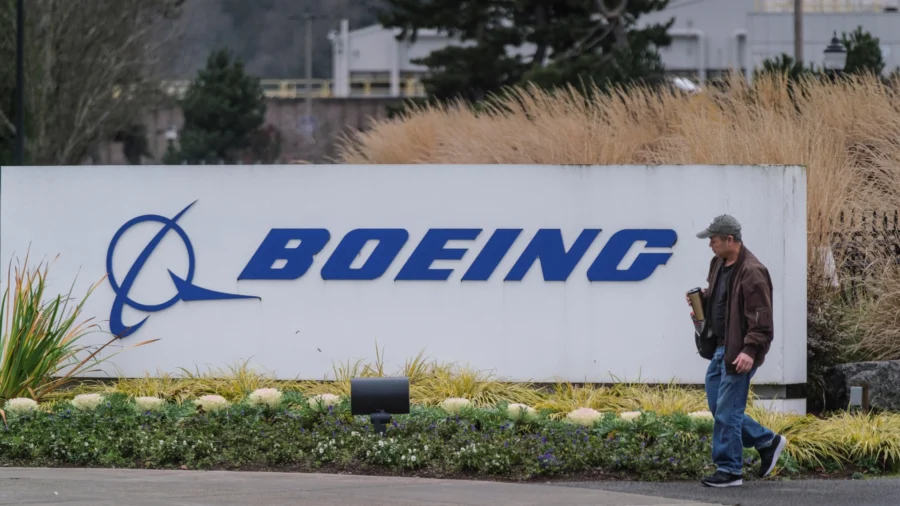Boeing workers could soon be heading for a strike, according to union leaders, who said that unless the company agrees to increase salaries by 40 percent over the next three to four years, the unions will push to move strike action forward.
“We don’t take going on strike lightly, but we’re willing to do it,” said Jon Holden, president of the International Association of Machinists and Aerospace Workers (IAM) branch in Seattle, which represents over 30,000 Boeing employees.
“Our goal is to negotiate a contract that we as a union leadership and our members can accept,” Mr. Holden told Bloomberg.
The announcement comes in the wake of a serious incident last month, when a door plug covering a decommissioned emergency exit came off mid-flight on an Alaska Airlines 737 MAX 9, forcing an emergency landing.
In response to the incident, Boeing scrapped its annual financial guidance and vowed to knuckle down on its quality control procedures.
“Our full focus is on taking comprehensive actions to strengthen quality at Boeing, including listening to input from our 737 employees that do this work every day,” the company’s CEO Dave Calhoun said in a press release.
“As we move forward, we will support our customers, work transparently with our regulator, and ensure we complete all actions to earn the confidence of our stakeholders,” he went on to say.
The near-disaster has presented a broader crisis for Boeing, with the company now faced with regaining the public’s trust, as well as the trust of regulatory authorities and airline decision-makers—included at United Airlines, one of Boeing’s biggest customers.
United CEO Scott Kirby recently voiced criticism of the aircraft maker, in a rare move that could point to an alternative direction for the airline’s future aircraft procurement.
“The MAX 9 grounding is probably the straw that broke the camel’s back for us,” he told CNBC. “We’re going to at least build a plan that doesn’t have the MAX 10 in it.”
While United has not cancelled any of the nearly 300 MAX 10 jets it has on order, it has, however, removed them from internal plans, Kirby said. This has raised some concerns about how the company would fill a potential backlog, as Boeing rival Airbus is facing supply-chain issues.
Union Blues
Boeing’s last deal with the IAM dates back to nearly a decade ago. At the time, the company had set a cap on pay increases to less than 1 percent on average, according to Business Insider. The company also terminated pension plans for non-union workers at that time. Both measures continued in place throughout the pandemic.
New contract negotiations are set to commence early next month.
“The anger that was experienced by our membership throughout that process in 2013 and 2014 is certainly palpable today. I hear it any time I’m in the factory, and from all across the spectrum,” Mr. Holden told Bloomberg.
NTD contacted Boeing for further comment, but did not receive a reply before this article was published.
The unfolding of the latest crisis involving the plane maker, alongside uncertainty over the future of the aviation industry, was at the forefront of an aviation conference in Dublin, Ireland at the end of January.
While Boeing last week declined to forecast its finances for the year, it aims to stay firm to its projected target of generating free cash flow of $10 billion over the next two years. However, this could be hampered if strike action does go ahead.
Quality Issues
Reports have suggested that other factors could have been at play in last month’s incident involving the Alaska Airlines MAX 9, such as the company’s prioritization of diversity quotas over other key metrics.
The FAA is actively seeking to employ people with severe mental and physical disabilities, who the Administration says are severely underrepresented in the workforce, Fox News reported last month.
The issue has prompted some public figures, including tech billionaire and Tesla CEO Elon Musk, to comment publicly on how flying has become less safe as a result of such measures.
“Do you want to fly in an airplane where they prioritized DEI hiring over your safety? That is actually happening,” Mr. Musk posted on X last month.


